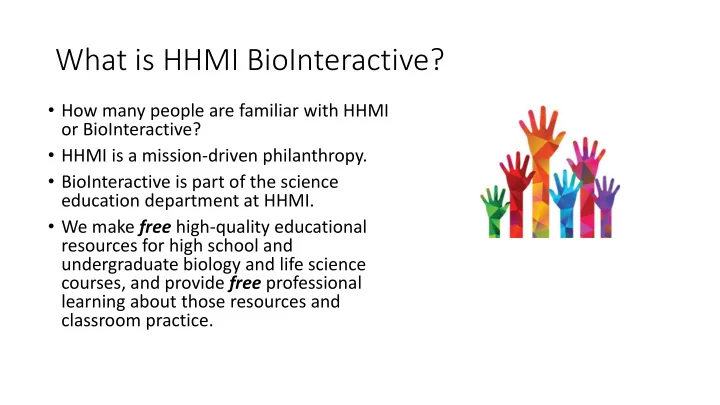

What is HHMI BioInteractive? • How many people are familiar with HHMI or BioInteractive? • HHMI is a mission-driven philanthropy. • BioInteractive is part of the science education department at HHMI. • We make free high-quality educational resources for high school and undergraduate biology and life science courses, and provide free professional learning about those resources and classroom practice.
Welcome to the New HHMI BioInteractive Site!
Access your favorite resources
Plan and sequence lessons and units
Hear from expert educators
See professional learning opportunities relevant to your practice
Houston Workshop • Saturday, December 14, 9:00AM-2:30PM • Houston Museum of Natural Science • Free • Breakfast, lunch, and parking provided • Audience: HS biology and environmental science teachers • We will send a registration form and additional details once we have a topic selected!
Option 1: Developing Students’ Data Literacy Skills using Free Resources from HHMI BioIn Interactive • Come explore free natural selection resources from HHMI BioInteractive that will help students build their data literacy skills while learning key content. Participants will engage in strategies to help students analyze data and write evidence-based explanations about real science phenomena and reflect on how the strategies and resources can be used in and adapted for their own classrooms.
Optio ion 2: Connecting Evolution and Genetic ics through the Phenomenon of Lactose Tolerance • Come explore free resources from HHMI BioInteractive that will engage students in understanding the phenomenon of lactose tolerance as they develop deeper understandings of the connections between evolution and genetics. Participants will engage in strategies to help students build their science practices skills, including analyzing data and writing evidence-based explanations.
Optio ion 3: Ecolo logy and Evolution in in Gorongosa Natio ional Park • Come explore free resources from HHMI BioInteractive connected to actual research being conducted in Gorongosa National Park in Mozambique that will help students build their science practice skills and develop a deeper understanding of ecology and evolution. The topics covered include biomes, food chains and webs, energy flow through trophic levels, human impacts, and evolution. Participants will engage in strategies to help students interpret graphs, gather and use evidence to make claims, build food web models to explain energy flow through ecosystems, and create and answer scientific questions using authentic science data.
Please select your preferences for topics: You may select more than one! Option 1: Data Literacy Option 2: Evolution and Genetics Option 3: Ecology and Evolution No preference Other: ______________ Questions? Contact Sydney Bergman at bergmans@hhmi.org.
Recommend
More recommend